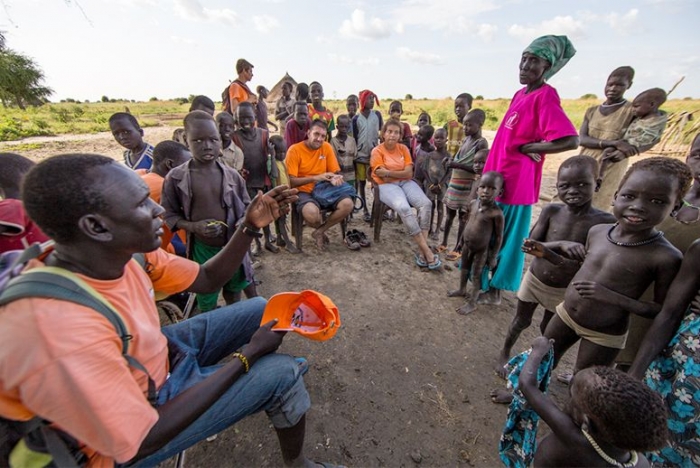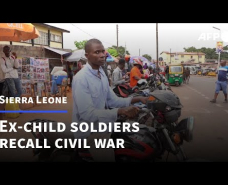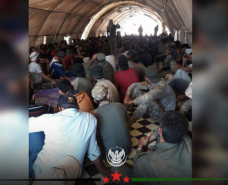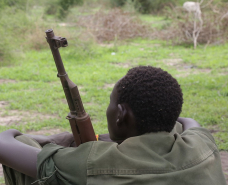As Civil War Rages in South Sudan, Kids Struggle to Hold On to Their Youth

By Fellipe Abreu, TakePart
At least 16,000 children have been recruited into the military since the conflict began in 2013.
As herds of cattle come and go on a narrow trail across a row of huts made from straw, mud, and wood, they pass a boy of about 15 sleeping in a chair near the main entrance. He is wearing black pants, rubber sandals, and an Ethiopian soccer team shirt. In his lap: an AK-47 rifle folding stock.
We are in Ulang—capital of Upper Nile state, in northern South Sudan—a region dominated by the Nuer ethnic group, which is opposed to the government, the Dinkas. Such masonry construction is where the opposition is headquartered, and the boy is one of the bodyguards. The region, historically a stronghold of the Nuer, lived in relative tranquillity until May 2014, when it was attacked by Dinka troops, resulting in dozens of deaths. Soon after, Ulang militarized.
Civil war has raged since December 2013, and approximately 16,000 children have been forcibly recruited by government forces and the opposition, according to the United Nations. Although the country's government and opposition signed a peace treaty in August of this year—and both sides have committed to not recruiting children and young people as soldiers—the cease-fire has been neglected, and thousands of children continue to face the battlefield.
“The recruitment of underage children is undoubtedly a major problem which directly affects the young population of the country,” Marta Hernandez, area and programme coordinator of international NGO Nonviolent Peaceforce, tells TakePart. “It is very common that both parties recruit boys for different purposes, ranging from the task of getting firewood for the troops to military training and working in the frontlines.”
To help alleviate the problem, international organizations have been developing child- and youth-protection projects in the country; Nonviolent Peaceforce is one of the most active organizations working to protect civilians and youths. N.P. has been working in South Sudan since 2010; its main objectives are to provide protection to the civilian population affected by conflict and to mitigate the effects of war.
NP has six child-protection projects around the country, each one with different approaches, depending on the needs of the region. In Ulang, the organization has implemented what it calls a Child Friendly Space, a type of designated safe zone. In partnership with the community, the organization empowers “entertainers”—community volunteers who organize and oversee the children’s activities—and offers a safe place for recreation and sports for approximately 5,000 young people per month.
On a typical day, in front of the Kopuot Primary School, which houses one of the two CFS sites in Ulang, a huge group of children can be seen playing volleyball or running from one side of a field to the other, screaming and chasing after a soccer ball that, in the middle of so many children, virtually disappears. At the other end of the school sits a partially destroyed building. The walls that remain standing are marked with dozens of bullet holes, a result of the government offensive in May; the school was a major target, and all teaching materials and supplies were torched. These days, classes continue, but the kids attend huddled on dirt floors, and small adjoining rooms are divided by tree branches and plastic.
“In times of emergency, like this one we are living [in] in South Sudan, children and young people lose their ties to the community, with family, and with other children,” says Ruth Nzisa Mutua, a child-protection officer in Ulang. “The CFS is a space that is open for them to come and can feel like a kid again. They are able to play freely, to communicate and share experiences with other children.”
Families in Ulang agree. One woman, whose identity N.P. withholds for safety reasons, is the leader of a group of local women involved with the organization and says that youths with nothing to do tend to be the most vulnerable to military recruitment. “Children are psychologically very affected by the conflict. It is normal, for example, that they quarrel with each other to resolve any problems," she says. "But with the CFS, children have a place to go and forget the war, develop their social skills, interact with each other."
Beyond the recruitment of child soldiers, another problem is the approximately 7,000 children who have been separated from their families since the start of the war. N.P. has created a family-tracing project to identify these young people and reconnect them with their families. Each child's information is placed on an online platform that can be accessed by all international organizations working on child protection anywhere in the country. When the family is not found or the child is an orphan, the organization strives to find another family who agrees to receive and care for the child, according to Mutua.
Although the initiatives are promising, there is still a long way to go. It's not uncommon to find young people participating in the child-protection projects as entertainers at the same time that they are active members of the military.
“That is the reality of the situation here," says Yasmin Anis, an N.P. staff member in Ulang. "Most young men around have either fought to protect this town [or have] some kind of access to a gun. The mentality of fighting is still very much a part of the culture here, and it will not change overnight. If we said we will not work with anyone who has access to guns, then we would have almost no one at our trainings."
Source: TakePart
Photo: Fellipe Abreu
Also see a recent report by Human Rights Watch on the use of child soldiers in South Sudan here.
Countering Military Recruitment

WRI's new booklet, Countering Military Recruitment: Learning the lessons of counter-recruitment campaigns internationally, is out now. The booklet includes examples of campaigning against youth militarisation across different countries with the contribution of grassroot activists.
You can order a paperback version here.








